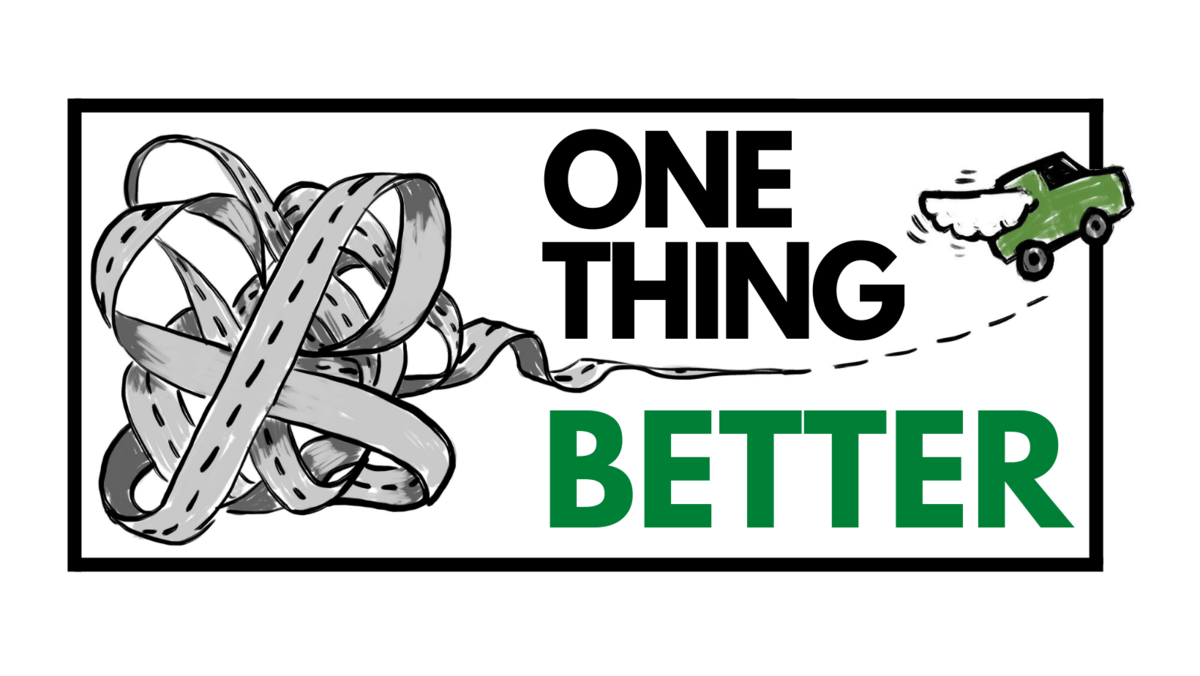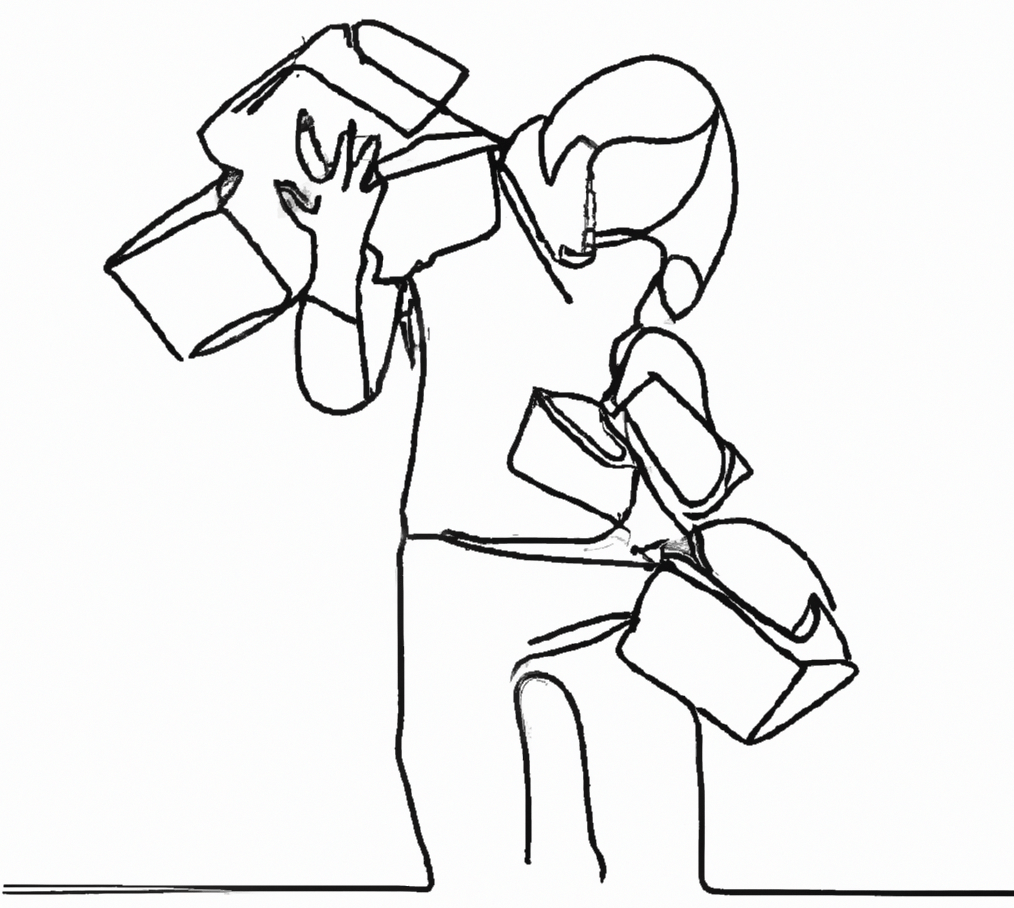- One Thing Better
- Posts
- How to Become Incredibly Valuable
How to Become Incredibly Valuable
It's not about doing everything. It's about doing one thing amazingly.

Welcome to One Thing Better. Each week, the editor in chief of Entrepreneur magazine (that's me) shares one way to level up — and build a career or company you love.
Today’s one thing: Trying to do everything.
That one thing, better: Maximizing what you’re great at.

DALL-E 2. Prompt: "one-line drawing of a person carrying many objects in their hands, but accidentally dropping some of them"
You’re not good at everything. And you think that’s a problem.
Why? For all the reasons!
Because being bad at something feels bad.
Because many people need many things from you.
Because if you’re not good at everything today, you worry your options are limited tomorrow.
But here’s the thing: You don’t have to be good at everything. In fact, it’s better if you’re not.
Today I’ll help you become even more valuable… by NOT doing everything. And I’ll start by introducing you to someone who learned this in a the largest possible way — by giving up one of the biggest jobs in the world.
Imagine almost having everything...
Here’s the scene: The year is 1999. Marc Randolph is the CEO and cofounder of a startup called Netflix, which is struggling to grow. He can’t figure out why.
Here he is back then.

Marc Randolph at Netflix HQ in 1999
One day, Marc gets a knock at his office door. It’s his cofounder, Reed Hastings, who asks if he can show Marc a PowerPoint presentation.
Sure, Marc says. So Reed begins.
“At first I couldn’t quite understand what was happening,” Marc told me in an interview.
That’s because this wasn’t a usual PowerPoint presentation. It was kinda… about Marc? It was a presentation about Marc, being shown to Marc?
Eventually, Marc got it. The PowerPoint presentation had a message, which was this: Marc should step down as CEO. And Reed should take his place.
I asked Marc how he processed this. He said:
I remember sitting in the dark for quite a long time, while the office slowly shut down around me. Then I remember driving home and sitting out on my back porch with my wife, having a glass of wine and talking this through — and recognizing that, although it was incredibly painful and disappointing, Reed was right.
And why was Reed right?
This would be the revelation that changed Marc’s life.
Marc dreamed of being a big-time CEO — the guy who can grow a company into the billions. But frankly, he was not good at doing that. It’s why Netflix was stuck.
That’s not to say Marc was useless, though. “What I truly loved was the early stages,” he told me. “And I'll be modest here — it's what I'm actually good at!”
In fact, this is exactly what he’d already done at Netflix! He turned an idea into a company. That's hard, and he did it well, because that’s what he is excellent at. But he wasn’t the guy to grow it into a billion-dollar company — because that’s someone else’s skillset.
Marc had a choice: He could either be an amazing version of his amazing self, or he could be a mediocre version of someone else.
He chose to be amazing. He stepped down as CEO and went on to a career helping early-stage startups — which is to say, Marc Randolph now wakes up every day doing the thing he is best at.
You can do that too.
Marc’s story can be shortened like this: He discovered his limitations, and it helped him recognize his strength.
Now think about what you’re struggling with. And ask yourself:
1. Why am I not excellent at this?
I’m using excellent on purpose. NBA All-Star Chris Bosh once told me, “We don't work to be average.” It’s true — we work to be excellent! Because excellence gives us purpose and excitement. And excellence is worth sharing. Other people deserve our excellence.
So, why are you not excellent? There are many reasonable answers to this. Maybe you’re learning something new. Maybe you’re exploring. Or building. I’ll do another obnoxious name-drop here: Ryan Reynolds once told me, "You can't be good at something unless you're willing to be bad." Also true! Excellence takes time, and it is hard, and that’s OK. If your new pursuit satisfies and excites you, then please, please — keep going.
But if you don’t have a good answer to the question, then it’s time to ask another one:
2. Is it because I’m excellent at something else?
This sounds so obvious. But in the moment, it doesn’t feel obvious. It sure didn’t to Marc.
Maybe the answer is right in front of you. Maybe it is not. Either is fine.
I’ve gone through a version of this myself. For most of my career, I aspired to be a celebrated magazine features writer. These are the people who write regularly for the New Yorker or the New York Times Sunday Magazine — whose big, award-winning, investigative articles get turned into movies, and are buzzed about by all the big-time journalists on Twitter.
But I never achieved that.
Oh, I tried! I really tried. I wrote a lot of magazine features. And they were received… fine. But no awards. No movie deals. The New Yorker never reached out. And deep down, I understood: I’m perfectly good at this, but I’m not excellent. And that hurts!
Now, third question:
3. What would happen if I just did the thing I’m excellent at?
Nobody ever said, "Shaq was a terrible basketball player because he couldn't shoot three-pointers." No. Shaq was amazing because he did a few things very, very well.
So try this thought experiment.
Let’s say you know what you’re excellent at. How much of your day is spent doing it? Twenty percent? Fifty, if you’re lucky? So what would it look like if you increased that? What if eighty percent of your day was spent on what you’re excellent at?
I bet it sounds good. Now, how do you make that happen?
Maybe you make a major change. Maybe you just do your job differently. Maybe you start offloading work that takes you away from your excellence. Maybe, maybe, you just start to see the pathway towards maximizing yourself…
Or maybe this isn’t possible right now. That’s also fine! Not all of us are Marc Randolph, who can just casually step down as CEO of a company. But we can build a bridge there. We can work backwards, and think: To get there tomorrow, what needs to happen today?
And what if you simply don’t know what you’re excellent at? Well, it’s time to think deeper.
Like I said: I am not an excellent magazine investigative features writer. But years ago, as I thought about it, I realized: I am excellent at something underneath that. I’m an excellent communicator. Magazine features were just one way I tried expressing that skill.
So what else can I do with that?
I didn’t really know. But I thought: I’ll just keep trying, and trying...
This gave me the freedom to explore the kind of writing I’m doing for you right now. It didn’t come naturally. I had a lot of imposter syndrome at first. I wondered: Will anyone take me seriously? It also required an emotional break with the work I’d done before — to think, “I am no longer that thing I identified with, but I'm making room to become something better.”
You know what got me through it? Once I started writing like this — earnestly, directly, helpfully, tapping into a part of myself I’d never let fully bloom — people sent me long, personal notes about how it impacted them. Nobody did that when I was just a magazine writer. And oh, it matters. It is an incredible gift, helping people like this.
It feels, in a word: excellent.
It’s time to maximize yourself.
I asked Marc Randolph if he has advice for others. And he does. “If people are looking for what success is,” he told me, “then spending your day doing the things you love: That's success.”
Success is not doing everything, in other words. It’s doing something — something meaningful, something purposeful.

DALL-E 2. Prompt: "one-line drawing of a person holding one large colorful object, very confidently"
You know who just took that advice? A reader of this newsletter who I’ll call Susan.
Susan read last week’s newsletter, which was about how to feel better quitting something. And it forced her to confront a reality: She’d built a business that she loved for a long time — but as it evolved, it took her further away from the work she was most passionate about.
“If I'm not fulfilled or inspired or doing the thing that lights me up, then am I really even doing my best work?” she wrote.
And so, prompted by my email, she talked to her team and decided to close the business. She wants to get back to basics — to the thing she loves, to the thing she is excellent at. “And I feel, what's the word I'm looking for? Magnificent. Buoyant. Elated. Free. Like the creative floodgates have reopened and in 72 hours my imagination and delight has returned," she wrote me.
Without knowing it, Susan did a version of what I suggested above. She asked why she wasn’t excellent at her work. She then asked if she was excellent at something else. And then she asked what would happen if she only did what she was excellent at.
And then, most importantly, she took that answer seriously.
Forget everything. The world does not need you to do everything, or to be everything. The world needs the thing you’re amazing at. So do it. Or hone it. Or at least give yourself permission to search for it, or inch your way towards it, because it is there, waiting to be activated, to become potent, extra strength, the iron core, the red-hot magma, the pure essence of excellence, the thing that makes you exactly who someone else needs, and when you devote yourself to it, as Susan found for herself, you will finally feel magnificent and buoyant and elated and free.
That’s how to do one thing better.
P.S. If you missed last week's newsletter about how to feel better about quitting something, please do check it out.
Let's Connect!
New to the newsletter? Subscribe here:
💌 What do you think? Let me know!
📕 Order my book to future-proof your career!
🎧 Latest podcast: Insults Are Awesome! Here's Why.